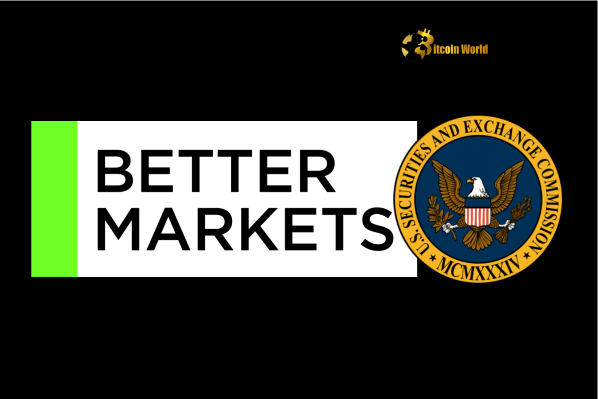BitcoinWorld

Explosive Criticism: Better Markets Slams SEC Crypto Oversight for Lack of Transparency
In the fast-evolving world of digital assets, regulatory clarity is paramount. However, a recent development has cast a spotlight on the perceived lack of transparency in how U.S. regulators are approaching this space. Better Markets, a prominent nonprofit investor advocacy group, has voiced strong criticism regarding the U.S. Securities and Exchange Commission’s (SEC) methods for handling SEC crypto oversight.
What is the Core Criticism of SEC Crypto Oversight?
On June 11, Better Markets sent a detailed letter to the SEC, specifically targeting the agency’s Crypto Task Force. The central point of contention? The SEC’s apparent preference for using informal staff guidance rather than adhering to formal notice-and-comment rulemaking procedures. This approach, according to Better Markets, fundamentally undermines key principles of effective and democratic regulation.
Here’s a breakdown of their concerns:
- Lack of Transparency: Informal guidance often lacks a clear public record of its development or the reasoning behind it.
- Limited Public Input: Unlike formal rulemaking, there’s no mandated process for receiving and considering feedback from the public, industry participants, or affected stakeholders.
- Weakened Accountability: Guidance documents may not carry the same legal weight or undergo the same internal review as formal rules, potentially leading to inconsistent application or enforcement.
- Erosion of Regulatory Legitimacy: When rules feel arbitrary or developed behind closed doors, it can diminish public trust in the regulatory body.
Better Markets argues that this reliance on informal methods for significant regulatory stances on complex issues within SEC crypto oversight creates uncertainty and can be perceived as regulation by enforcement or by opaque directive.
Why is Formal Rulemaking Preferred by Advocates Like Better Markets SEC?
Formal notice-and-comment rulemaking is a cornerstone of the U.S. administrative process. It’s designed to ensure that significant regulatory actions are developed transparently and with public participation. The process typically involves:
- The agency publishes a proposed rule in the Federal Register (the “notice”).
- The public is given a specific period to submit comments on the proposed rule (the “comment” period).
- The agency reviews and considers all submitted comments.
- The agency publishes a final rule, often including responses to the significant comments received, explaining any changes made from the proposal.
This structured process allows for diverse perspectives to be heard, potential unintended consequences to be identified, and the final rule to be more robust, legally defensible, and understood by those it affects. For an area as novel and rapidly evolving as cryptocurrency, many argue that this rigorous process is essential for building a sustainable regulatory framework.
The Meme Coin Example: A Case Study in Questionable SEC Guidance
Better Markets didn’t just make general claims; they provided a specific example of what they see as flawed SEC guidance. They pointed to a statement made by SEC staff in February regarding meme coins. This statement labeled meme coins as “collectibles” despite their widely acknowledged speculative and volatile nature, which often drives their trading activity more than any intrinsic collectible value.
Labeling something with significant trading volume and speculative interest purely as a “collective” through informal guidance, without a formal analysis or public input, raises questions about the basis for that classification and its implications for how these assets might be treated under securities law. Better Markets views this as an instance where informal guidance sidestepped a more thorough and transparent process needed to appropriately characterize such assets.
What are the Implications of Lacking Crypto Regulation Transparency?
A lack of transparency in crypto regulation transparency has several potential negative consequences for the market and its participants:
- Market Uncertainty: Businesses and investors struggle to understand what is and isn’t allowed, hindering innovation and investment.
- Uneven Playing Field: Regulatory actions might seem unpredictable, favoring some entities over others based on interpretations of informal guidance.
- Reduced Investor Protection: Without clear rules developed through a public process, investors may not have adequate safeguards or understanding of the risks involved.
- Chilling Effect: Companies may be hesitant to develop new products or services in the U.S. due to fear of falling afoul of unclear or unpublished regulatory stances.
- International Standing: A lack of clear, transparent rules can impact the U.S.’s position as a leader in financial innovation compared to jurisdictions with more defined frameworks.
Better Markets argues that restoring trust and fostering healthy market development requires the SEC to commit to formal public rulemaking for significant regulatory decisions impacting the crypto asset class.
The Path Forward: Demanding Formal Rulemaking
The call from Better Markets is clear: the SEC should revert to its established processes for developing significant regulations. This means:
- Issuing proposed rules for public comment.
- Providing clear rationale for regulatory decisions.
- Allowing stakeholders to provide input and for the agency to consider it meaningfully.
While informal guidance can be useful for minor technical points or clarifying existing rules, applying it to fundamental classifications of novel assets like meme coins or establishing broad regulatory stances on digital assets is seen by critics as inappropriate and detrimental to good governance and market clarity. The debate between relying on SEC guidance versus pursuing formal rules is likely to continue as the regulatory landscape for crypto evolves.
Conclusion: The Critical Need for Transparent Crypto Regulation
Better Markets’ criticism highlights a fundamental tension in regulating a rapidly changing technology like cryptocurrency. While regulators face pressure to act quickly, sidestepping established processes designed for transparency, public input, and accountability can erode trust and create more problems than it solves in the long run. The call for the SEC to embrace formal rulemaking is a call for a more predictable, understandable, and democratically legitimate approach to integrating digital assets into the existing financial framework. How the SEC responds to this criticism will be a key factor in shaping the future of SEC crypto oversight and the broader crypto market in the United States.
To learn more about the latest crypto regulation trends, explore our article on key developments shaping the regulatory landscape for digital assets.
This post Explosive Criticism: Better Markets Slams SEC Crypto Oversight for Lack of Transparency first appeared on BitcoinWorld and is written by Editorial Team




